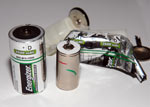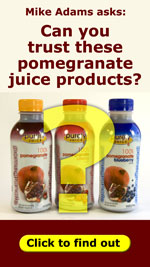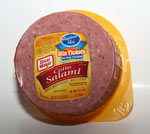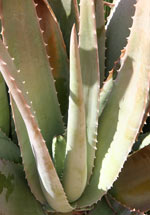|
Pomegranate and Blueberry Juice Consumer Shopping Guide
A NaturalNews PhotoTour by Mike Adams
|

 2. Most of these pomegranate / blueberry juice products come in plastic containers. Plastics, you may know, often contain the bisphenol-A chemical which is thought to contribute to various cancers. The best products come in glass containers, not plastic. (I recommend buying fruit juices in glass wherever possible.) 2. Most of these pomegranate / blueberry juice products come in plastic containers. Plastics, you may know, often contain the bisphenol-A chemical which is thought to contribute to various cancers. The best products come in glass containers, not plastic. (I recommend buying fruit juices in glass wherever possible.)
3. There are likely pesticide residues in the non-organic juice products. Pesticides aren't listed on the ingredients label, but they're nonetheless present. However, the benefits of consuming these superfruits far outweighs the health effects of trace pesticide consumption, in my opinion, so from a personal perspective, you're still protecting your health with these juice products even if you consume some pesticide residues. For the record, I do not support pesticide use in agriculture and I believe that consumers should buy organic products whenever possible.
4. Some of the healthiest products taste the most bitter. The best-tasting products likely use filler juices such as apple juice and grape juice (which tastes sugary!). Pure pomegranate juice is somewhat bitter and not at all super sweet. So don't judge the quality of these products by how good they taste. The best taste may mean the worst nutrition.
5. Juice concentrates are never as good as fresh juices. Of all the brands reviewed here, most were made from juice concentrates. This means the pomegranates are harvested, blended and dried (usually at high temperatures), then shipped to another facility where the concentrate is re-hydrated, then pasteurized (heated again) and shipped off to the grocery stores. While this process keeps costs down and makes these products more affordable, it also destroys some of the medicinal phytonutrients found in pomegranate juice.
6. Country of origin labeling is not mandatory. Where does all the pomegranate concentrate come from for the products that use concentrate? Nobody knows! One company does say their concentrate is from Turkey, but other companies list nothing. I can tell you from experience that some of this stuff comes from China and is probably contaminated with various heavy metals or scary agricultural toxins. China is the cheapest sources for just about everything in the food and supplement business, but it's also the most highly contaminated source in the world. Sadly, there is no requirement for juice companies to list the country of origin for their juice concentrates.
Click NEXT to read an important note about the sugar content of these juices...

 Want more PhotoTours like this e-mailed to you when they're available? Click here for free e-mail alerts. Want more PhotoTours like this e-mailed to you when they're available? Click here for free e-mail alerts.
Support NaturalNews by linking to this PhotoTour
Copy and paste the following HTML code into any web page:
|
This site is part of the NaturalNews Network ©2004,2005,2006,2007,2008 All Rights Reserved. Privacy | Terms
All content posted on this site is commentary or opinion and is protected under Free Speech. Truth Publishing
International, LTD. has full ownership of and takes sole responsibility for all content. Truth Publishing
sells no health or nutritional products and earns no money from health product manufacturers or promoters. The information on this site is provided for educational and entertainment purposes only. It is not intended as a substitute for professional
advice of any kind. Truth Publishing assumes no responsibility for the use or misuse of this material.
Your use of this website indicates your agreement to these terms and those published here. All trademarks, registered trademarks and servicemarks mentioned on this site are the property of their respective owners.
|
|
Next:




See More
Astonishing Photos:

Energizer batteries exposed!


Mystery Meat Macrophotography (gross!)

How to harvest fresh aloe vera gel (step by step)
|
|




